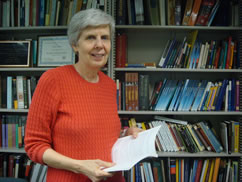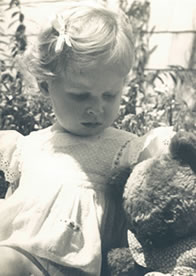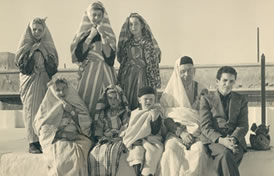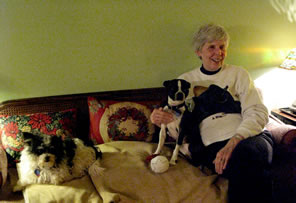Vol 8 Issue 2SectionsPriorities This IssuePrioritiesThoughts on “Food, Family, Friends, and Faith: Celebrating Interview with Dr. Nancy Whitt, Quaker/ Grandmother’s Fruitcake Family>> TransitionsTraditionsChristmas Traditions and Transitions>> Sensory Christmas Traditions>> An Interview with Rabbi Jonathan Miller, Temple Emanu-El>> Wisdom & Wondering
|
Thoughts on “Food, Family, Friends, and Faith: Celebrating the Holidays!” and the Future of ecumininet online!Interview with Dr. Nancy Whitt, Quaker/Mother/Professor
Dr. Whitt lives in Birmingham, Alabama, where she practices her Quaker faith. She received her B.A. in journalism and her M.A. and Ph.D. in English from the University of Alabama, where she studied topics such as American literature, women’s studies, and Shakespeare. Her interests are wide-ranging. Dr. Whitt is a member of the Birmingham Boston Terrier Rescue, a certified hospital chaplain, and she is certified in feminist spirituality and theology. Casey: Could you tell us about yourself? Dr. Whitt: My father was a Presbyterian minister who had two small churches in the Ozarks when I was born in Ft. Smith, Arkansas, in 1943. From there we moved to Smyrna, Tennessee, where he was a chaplain in the Army Air Force, then we moved to a Native American church in Colony, Oklahoma, after which he was called back into the Air Force and from there we moved around a lot, including tours in Libya, England, Utah, Arkansas, Illinois, and Minnesota. My mother was from a Bohemian family in Chicago. I have three sisters and a brother. We were each born in a different state. Presently, we live in different states; my brother lives in Quebec City. My parents sent me down on a Greyhound Bus from Duluth, Minnesota, to the University of Alabama in Tuscaloosa in 1961 and except for a year here and there and a lot of summer travel, I’ve been an Alabamian ever since. I earned a B.A. in journalism from UA, and an M.A. and a Ph.D. in English. I attended the Women’s Theological Center, then affiliated with Episcopal Divinity School in Boston, and received a certificate in feminist spirituality and theology. I also received a certificate as a hospital chaplain through a clinical pastoral education course. I have a 24-year-old daughter, Vassilka, who came to me at almost 12 years old from Bulgaria. She’s smart, funny, loving and drop-dead gorgeous. I read a lot; I travel; I am a member of the Birmingham Boston Terrier Rescue and am currently trying to find a home for a foster dog, named Boogie. I’m active in the Alabama Faith Council and believe very strongly in interfaith dialogue. I also believe in service and activism in favor of those whom Jesus called “the least of these.”
Dr. Whitt: My dad was a Presbyterian minister. I grew up in military Protestant (ecumenical services). My dad was very open to those of various faiths, including the Muslims we met in Tripoli, Libya. Our chapel programs and our home were filled with people of all races and faiths. At Alabama I attended University Presbyterian Church. From my years at home I learned that people of various faiths can know each other “in that which is eternal.” From my years at University Presbyterian Church, of which I was a founding member, I learned that one must put faith into action for it to truly live. This combination led me in Birmingham, as I was seeking a faith community, to feel spiritually ‘at home’ during my first Quaker worship service in 1973 or 74. I had been a Friend, but did not know a community of Friends existed. Casey: Could you inform us about the Quaker faith and its practices? Dr. Whitt: The Religious Society of Friends (Quaker) honors that of God in each person. We are the ultimate in the priesthood of believers; we are all ministers with direct access to the Light Within or the Holy Spirit. (We thus have no laity.) We sit in corporate silence for worship. If anyone is led to speak out of the silence, she or he will do so. All sacraments are spiritual to us; we have no outward sacraments (communion, baptism, etc.). We search for God’s truth in all our endeavors. Meetings for worship with a concern for business lead us to seek the way of the spirit. We do not vote, but wait for a ‘sense of the meeting.’ We are non-creedal. Our years of prayer and searching are reflected in our ‘testimonies’ in such areas as care for the earth, equality, peace, integrity, service. . . .We are pacifists, believing that all persons are brothers and sisters and all persons are bearers of the Light Within. We work hard to undo the causes of war. Our equality lends itself to seeing the value of all persons: male/female, gay/straight, white/black/Hispanic/Asian, and people of all faiths. We are called toward social and economic justice for all persons. My favorite Quaker quotation comes from one of the founders (Margaret Fell was the other), George Fox: “Be patterns, be examples in all countries, places, islands, nations, wherever you come, that your carriage and life may preach among all sorts of people, and to them; then you will come to walk cheerfully over the world, answering that of God in everyone.” (George Fox, 1656) Notice that it is “life” and “carriage,” in other words, “example,” rather than words that preach to people.
Dr. Whitt: My magical moments as a child were spent around the real Christmas trees with large colored lights and lots of tinsel. As a child in our small country church in Oklahoma, we would stage Christmas pageants, wearing bathrobes and towels around our heads to act out the Christmas story. As a graduate student in English literature, I was gratified to learn that all of European drama grew out of clergy enacting first the Easter, then the Christmas stories for their congregations. I remember my first appearance had something to do with being “only four years old” and throwing kisses to the congregation. In the sixth grade, when it was a great honor, I got to play Mary. In the Air Force we would begin New Year’s Eve with Christmas caroling, then have an early candlelight service. It was in my mother’s tradition to open gifts on Christmas Eve, so after candlelight services, we would all gather around the tree. On Christmas Day we would go to the mess hall or the officers’ club or the NCO club (as a chaplain, my dad was welcome anywhere!) for a major feast of turkey, many kinds of dressing, vegetables, breads, many desserts, fruit and candy. One of my most memorable Christmases was in Libya, when I played the starring role in “The Little Stranger.” (“I was a stranger, and you took me in…”) and listened to myself on radio all the while keeping my eye on a large box that I knew contained my first Toni doll that I had picked out myself. She was blonde, wore a pink dress, and came with sugar water and curlers so I could perm her hair. I named her “Cynthia,” the prettiest name I knew. Christmas carols always put me in a spiritual place: “O Little Town of Bethlehem,” “Lo, How a Rose E’er Blooming,” “O Holy Night,” “Come, o Come Emanuel,” “Joy to the World,” and, of course, “Silent Night” were truly gateways to the Spirit for me. Mostly our Christmases were immediate family (two parents, five kids, two dachshunds) because we did not live near grandparents, aunts, uncles or cousins. Christmas was a time spent with our friends in church and/or chapel services, then a time for close family bonding—it was a time of true belief—secure, warm, and awe-inspiring. Casey: How do you honor these celebrations/traditions today? How does this connect to your faith and its practices?
Casey: Please tell us about your profession and your “path” in life. Has your faith affected this in any way? Dr. Whitt: Friends have two phrases that speak to me. One is “walking in the Light”; the other is “as way opens.” Those phrases define my path. I’ve always felt I had a pastoral, ministerial leading and as a Friend, as a colleague at Samford, and as a teacher, I have felt I have followed this leading. I have served in many areas of Friends, holding various positions in my local Meeting and on national committees, yearly meetings, and boards. I was excited and renewed by feminist theology and spirituality in the ‘70’s and have had a special ministry to women, including Quaker women. I am grateful for the poetry I read and can pass along, and for the literature by women and by ethnic writers I can teach and share with others. I believe the God is present and can be felt through these works. My sense of God is that God is imminent; I find God in connection with others – in their physical presence and in their words – I believe the spiritual Canon is still being written, the record of God’s interaction with humanity. I find God’s presence in Meeting for Worship, in special connections with students and colleagues, in interactions with my daughter and my nieces and nephews and my sisters and brother, as well as the others in my family, including my family of choice, my friends. I also find God in the humor and love of my pets. As Walt Whitman says,
Friends originally did not celebrate holidays any more than any other day, because each day is sacred. Contemporary Friends agree, but see special celebrations as needed reminders that each day is sacred. Casey: Do you have any words of wisdom to share with the reader for the holidays? Dr. Whitt: You really do find happiness when you serve others; you’ll find the truest friends, those with the deepest spirits, among those who serve alongside of you. © 2008 ecumininet online! Spiritual Systems, Inc. All Rights Reserved
| View
for Printing
|
| All Content Copyright © 2008-2009 ecumininet online!, Spiritual Systems Inc. All Rights Reserved- Site Design & Maintenance By Atomic Pixels | ||

 As an intern for
As an intern for Casey:
Casey: Casey:
Casey: Dr. Whitt:
Dr. Whitt: